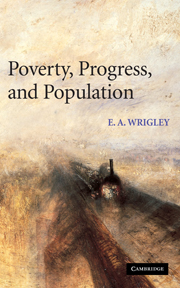Book contents
- Frontmatter
- Contents
- List of figures
- List of tables
- Acknowledgements
- Introduction
- PART I The wellsprings of growth
- 1 The quest for the industrial revolution
- 2 The divergence of England: the growth of the English economy in the seventeenth and eighteenth centuries
- 3 Two kinds of capitalism, two kinds of growth
- 4 Men on the land and men in the countryside: employment in agriculture in early nineteenth-century England
- 5 The occupational structure of England in the mid-nineteenth century
- 6 Corn and crisis: Malthus on the high price of provisions
- 7 Why poverty was inevitable in traditional societies
- 8 Malthus on the prospects for the labouring poor
- PART II Town and country
- PART III The numbers game
- Bibliography
- Index
7 - Why poverty was inevitable in traditional societies
Published online by Cambridge University Press: 23 December 2009
- Frontmatter
- Contents
- List of figures
- List of tables
- Acknowledgements
- Introduction
- PART I The wellsprings of growth
- 1 The quest for the industrial revolution
- 2 The divergence of England: the growth of the English economy in the seventeenth and eighteenth centuries
- 3 Two kinds of capitalism, two kinds of growth
- 4 Men on the land and men in the countryside: employment in agriculture in early nineteenth-century England
- 5 The occupational structure of England in the mid-nineteenth century
- 6 Corn and crisis: Malthus on the high price of provisions
- 7 Why poverty was inevitable in traditional societies
- 8 Malthus on the prospects for the labouring poor
- PART II Town and country
- PART III The numbers game
- Bibliography
- Index
Summary
That poverty was the lot of the large majority of people in all or almost all societies before the industrial revolution is widely recognised. Poverty is a general and rather abstract concept. Its reality was bitter and particular: a hungry child, apathetic from lack of food; a shivering family unable to buy fuel in a harsh winter; the irritation of parasites in dirty clothing and the accompanying sores and stench. The extent and severity of poverty in the past is difficult to express in quantitative terms for lack of relevant data in most cases, but that the poor were very numerous and that they suffered greatly at times in most societies is an assertion unlikely to be widely challenged. When St Matthew reports Jesus as saying, ‘ye have the poor always with you’, the context suggests that the remark was not controversial.
In industrialised countries today poor people may still be found. Their poverty is, however, now taken to be problematic in a way that used not to be the case, because it is widely believed that the continued existence of poverty reflects not the intrinsic nature of the human condition but the failure of the social system or the political regime. The capacity to produce on a scale to provide acceptable minimum conditions for all patently exists, and it is therefore natural to argue that poverty can be overcome by an act of will, by a suitable piece of social engineering.
- Type
- Chapter
- Information
- Poverty, Progress, and Population , pp. 212 - 228Publisher: Cambridge University PressPrint publication year: 2004



